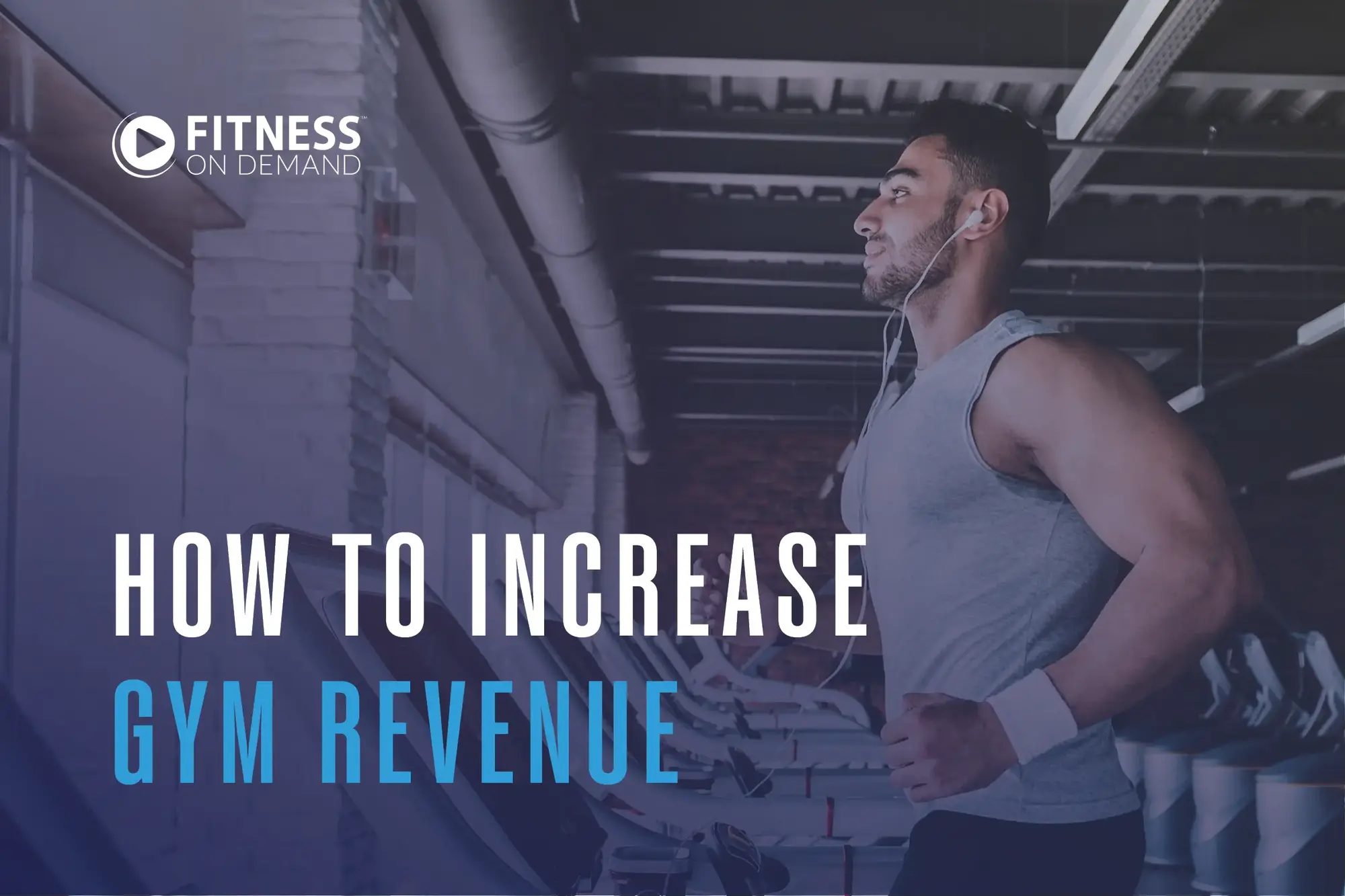We know that, in today’s market, adding more square footage isn’t always financially ideal, and hiring more staff isn’t getting easier either. But there’s another way to increase gym revenue: one that involves boosting profits without expanding your space and workforce.

Below, we’ll go over 12 different strategy ideas on how to increase gym revenue and maximize your return on investment (ROI) per square foot.
5 Retention Hacks
Explore these five practical and innovative strategies to increase retention, boost engagement, and embrace personalization. Download our eBook to get started!
Why Growing Revenue Doesn’t Always Mean Growing Square Footage
Gym owners often assume that boosting revenue requires adding more space and equipment. Yet, rising construction costs and limited space make expansion unrealistic for most fitness centers. Building even a modest new studio can add up to tens of thousands of dollars—and that’s not to mention the staffing constraints you need to face when adding square footage.
The good news? Digital value and flexible offerings can increase your gym revenue streams within the existing four walls. Pouring capital into new construction is always an option, but you can also do more with what you already have.
12 Practical, High-ROI Ideas to Increase Gym Revenue
Growing your gym’s income without costly expansions is easier said than done. But we’ve done the heavy lifting for you: below, we’ve gathered 12 practical ideas to boost revenue. All of these are not only scalable but also require minimal overhead.
Start With Your Revenue Model: What’s Working and What’s Not
Before launching new initiatives, you need to take a hard look at your current revenue model.
Try to break down where income comes from, analyze trends, take note of underperforming areas, and track key metrics. This data-driven approach, although seemingly tedious at first, allows you to spot opportunities and leaks at the core of your fitness business model.
Maybe your evening classes are packed while mid-afternoon hours sit empty. Understanding your revenue streams and patterns lets you prioritize high-impact interventions. In other words, audit your current model first, and then double down on what works and fix what doesn’t.
Introduce Tiered Memberships and Value-Based Pricing
One-size-fits-all services are never the answer—and even less so in audiences as diverse as gym-goers.
Implementing tiered membership rates kills two birds with one stone: it captures more value from members willing to pay for premium features while attracting customers tight on their gym budget. For example, you could have:
- A basic tier that only allows gym access during fully staffed hours
- A premium tier that gives 24/7 access with group classes included
- A platinum tier that also allows unlimited on-demand virtual classes and other perks
Tiered options let you justify higher price points. Always make sure to emphasize the value of each option, and listen closely to feedback to further refine the tier system.
Increase Gym Revenue Through On-Demand Fitness Content
Digital fitness trends have blossomed over the last few years. On-demand content, ranging from nutrition workshops to entire fitness classes, fills schedule gaps and adds value without extra staff. That empty studio at 2 PM? Now it’s the perfect place for a small group that wants to follow a yoga class video.
Offering on-demand content outside the gym, however, is just as powerful. It allows members to keep engaging even on days they can’t come in person, further boosting retention rates. Paired with tiered gym membership types, on-demand content is the best way for small gyms to increase revenue.
Monetize Digital Signage and Smart Displays
Blank walls are prime real estate for digital signage: a modern, dynamic way to get in touch with your members in real time. Moving content catches the eye—so why not take advantage of it to improve revenue?
Use TV screens and projectors to promote revenue-driving offerings. Personal training packages, upcoming workshops, retail products, or new tier benefits are just some examples of promos members might otherwise overlook.
You can also monetize digital signage through partnerships such as ad spots for local businesses. The key is that every screen in your gym should be pulling its weight, and not mindlessly screening TV channels that members can't actually engage with.
Launch Group Training or Specialty Class Upsells
Not every member will want to participate in group training—but you can drive a lot more value from the ones that do.
For example, short bootcamp or weekly specialty classes can be charged extra without requiring long-term staffing. You can schedule them in otherwise quiet hours and create a sense of “exclusive experiences” that members consider worth paying for.
A variety of group and specialty offerings will not only bring in direct revenue but also make your gym more attractive for existing and new members. People are naturally more inclined to participate regularly in group activities, so these upsells can pay off much more than they might seem at first glance.
Create Exclusive Content or Community Challenges
You want to give your members something they can’t get anywhere else. Namely, exclusive digital content and community fitness challenges.
Exclusive content could be as simple as weekly workout videos and healthy tips recorded by your trainers and delivered via email or your gym’s app. You could also build a small video library with exercise tutorials and nutrition seminars that members can access both inside and outside the gym.
Community fitness challenges don’t require new equipment or space, yet they can boost member participation and loyalty. They tap into key motivators like competition and camaraderie. Running a “30 Days, 30 Miles” challenge, for example, can create consistency among members who are on the verge of dropping out.
Leverage a Referral and Loyalty Program That Actually Pays
There’s no better marketing than word of mouth from your most loyal and satisfied customers. Creating a robust referral program can bring in new members at virtually no cost—but existing customers should feel rewarded for doing so.
For example, you might offer one free month for both the referrer and the new sign-up or free access to a specific set of classes. Try to also promote the program constantly by using your digital signage and having front-desk staff remind members every once in a while.
Besides referrals, you should also consider loyalty programs that boost engagement from active customers. Members could earn points for check-in streaks or posting on social media, which they could later redeem for merch or service discounts.
Offer Flexible and Off-Peak Memberships
Hand in hand with tiered memberships comes the idea of flexible membership options.
Off-peak membership, for example, allows access only during specified low-traffic hours (say, weekdays during working hours). This draws retirees or budget-minded people with flexible schedules while also letting you fill the downtime with new customers.
Another flexible approach is offering class-only membership fees that don’t include general gym access, for example a 10-visit pass could reel in people who aren’t willing to commit to a monthly plan. Or, if you want to take it a step further, on-demand class and mobile app memberships are a strategic way to keep members engaged throughout vacation season or holiday season. This was your members can still get their workout in without feeling like their wasting money on a membership they aren't taking full advantage of.
Boost Member Retention With Automated Check-Ins and Progress Tools
It’s known that gym member retention strategies are way more cost-effective than chasing new customers. And those first few months in the gym are absolutely crucial for keeping customers in the loop.
A great way to improve engagement is with automated check-ins and follow-ups. Use your gym management software or app to send an automatic notification if a member hasn’t checked in for more than a week. The opposite is also worth your time: congratulate and encourage members who are on a streak and recommend classes based on their usage patterns.
Progress-tracking tools are another key piece of the puzzle. Members should be able to record workouts, set fitness goals, and measure progress to see improvements and milestones hit over time.
Use Seasonal Campaigns to Promote Limited-Time Upsells
Take advantage of time-sensitive offers tied to seasons or other events to boost sales of limited-time services. Start by planning out a calendar of seasonal campaigns with relevant upsells such as “New Year, New You” or “Summer Shape-Up” packages.
The key to seasonal upsells is to make them feel special and urgent. You want members to not want to miss out through language such as “limited-time” or “only this month.” Again, leverage your digital signage to showcase these offers along with targeted notifications and emails.
Streamline Operations With Automation to Cut Costs
Increasing revenue doesn’t necessarily have to do with members and selling more. It’s also about improving profit margins by cutting unnecessary costs.
Automation can reduce overhead, boosting net revenue without necessarily relying on new sales. Class scheduling, check-ins, billing, and membership renewals are just a few examples of workflows that can be put on autopilot to free up your front-desk staff.
Again, virtual classes fall under the automation umbrella, as they allow specialized classes to run without being tied to instructor schedules. The key is to cut costs without sacrificing consistency and reliability for your current members.
Measure ROI and Test, Tweak, Repeat
Last but not least, treat every revenue idea as a constant experiment. Measure, evaluate, and refine—this constant cycle of continuous improvement will keep your cash flow management and growth sustainable.
For any marketing strategy you implement, define specific gym performance metrics to track its performance. As soon as the first results come in, don’t be afraid to tweak the strategies based on these key performance indicators (KPIs). Involve your team, and always keep your ear out for customer feedback.
Fitness On Demand: A Digital Revenue Stream for Modern Gyms
At Fitness On Demand, we understand that many of the ideas above need to be supercharged by the right digital platform.
Our solutions enable gyms to implement on-demand content, branded mobile apps, signage integration, and engagement tools without doing the heavy lifting. Through our mobile Flex App, for example, members can access over 1,200 classes and receive in-app workout challenges and push notifications.
But Fitness On Demand’s offerings don’t stop there—get in touch with our team today to increase revenue at your gym with digital fitness.

Author
Sean Obregon
Sean Obregon is an impactful Business Development Executive forming meaningful relationships to support enhancing operational and strategic success. He utilizes his industry knowledge and experience to create solutions that align with both the needs and wants of a customer, setting a business up for success.
